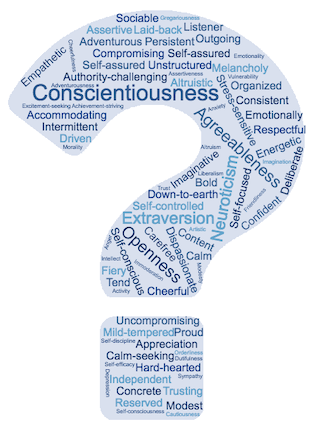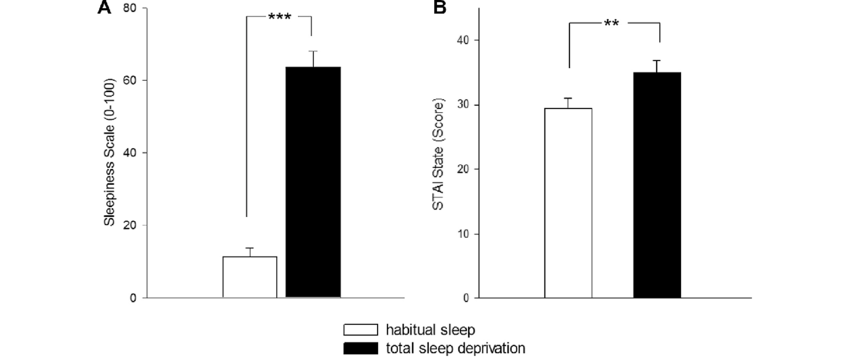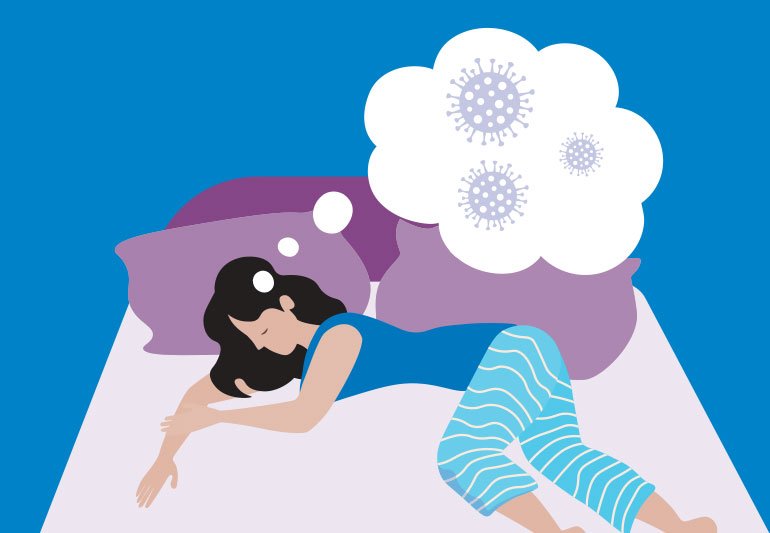Sleep Deprivation Test
If you sleep for less than 4 hours, your body will not work well. You might feel bad and get sick. People die from too little sleep! In this case, you might need a sleep deprivation test. It may help you to have a slightly accurate diagnose of the severity of the problem.
Contents
What is Sleep Deprivation?

Sleep Deprivation is a lack of sleep that can cause distress and mood changes. It can also cause a loss of concentration and poor judgment.
If you want to know how sleep deprivation affects your body, we will explain some of the most common symptoms:
- Drowsiness and tiredness
- Headaches and muscle pains
- Blurred vision or dry eyes
- Impaired memory, concentration, and decision making
- Impaired immune system and increased chance of illness
- Irritability, anxiety, or depression
- Increased risk-taking behavior
So what happens to your body if you sleep for less than four hours a night? In fact, the negative effects on health are much more harmful in people who often do not sleep enough. The lack of rest is associated with obesity, type II diabetes, cardiovascular disease, and heart problems.
The most severe effects are on the immune system because there is a decrease in white blood cells that fight infections. People who do not sleep enough have an increased risk of cancer due to the slowdown of metabolic processes at night when we sleep. Also, lack of rest increases inflammation which leads to pain and fatigue.
Sleep deprivation is an epidemic that can lead to many problems if it goes on for a long time because sleep has numerous functions, including the regulation of metabolism, cell repair function (protein synthesis), memory consolidation, detoxification processes in the brain as well as hormonal secretion.
Causes of Sleep Deprivation
People who have a lack sleep tend to have irregular sleeping habits where they stay up late and get tired during the day. A few causes are:
- Working long hours without rest: if you work for more than 12 hours per day without a break, this will affect your sleep quality
- A bad sleeping environment: if there is too much noise or light it can prevent people from going to bed and being well-rested. Also, having uncomfortable mattresses or pillows affects the way we wake up. Finally, many studies show that having a pet in the bedroom can reduce sleep quality due to allergies.
- Vitamin deficiency: lack of vitamin D, B vitamins, and magnesium are associated with insomnia, stress disorders, and anxiety. This is why it is important to eat foods rich in these nutrients like dark leafy greens, nuts, and seeds.
- Anxiety about not getting enough sleep, especially if it happens every night for weeks on end.
- Excess sugar, caffeine, and alcohol consumption. These substances affect the quality of sleep because they cause dehydration which can lead to insomnia or waking up in the middle of the night. Also, stimulants like coffee prevent people from falling asleep at their regular time without having any positive effect on energy levels during day time. This is why it is
- Not getting enough exercise
A person’s age can affect how much sleep they need. Babies and children require the most: newborns need up to 18 hours of rest! Teenagers usually don’t get as much sleep as adults, so this is common for that group. On average, people aged 26-64 years old need about seven to nine hours of sleep, while people over 65 often need even less.
Diagnosis of Sleep Deprivation
You can diagnose sleep deprivation by asking the following questions:
Do you have difficulty falling asleep? Are you in a habit to wake up in the middle of the night and not being able to fall back into a deep slumber again?
Do you feel tired during the daytime that doesn’t seem related to an insufficient amount of hours slept? If your answer is yes to all these questions then you are most likely sleep-deprived.
Treatment of Sleep Deprivation
The best form of treatment is prevention, so the first thing to do if you think that you’re not getting enough rest is to analyze your sleeping habits and improve them! There are many ways how this can be done but here are the most effective ones:
Keep your bedroom cool and dark. A darker room will make it easier for you to fall asleep, while a cold temperature helps the body prepare for rest because it decreases its metabolic rate. Avoid caffeine before bedtime as well as smoking because both these activities stimulate the nervous system which makes falling asleep more difficult. Creating wind downtime can also help since this is when all our muscles start to relax after being active during the day by reading or meditating on soothing topics that don’t put stress on us like nature or music. Finally, people who sleep less than seven hours should exercise every day because this activity gives them energy throughout the whole day!
Sleep Deprivation Test
You may already know that sleep deprivation tests or “sleep loss studies”, as they are also called, test the effects of a lack of sleep. These types of experiments involve depriving sleeping volunteers (volunteers who agree to participate in medical research) of their regular nighttime rest and seeing how well they perform during their usual daily activities such as work or school.

Do you feel more sad than usual?
- Never
- Rarely
- Sometimes
- Often
- Very Often
Do you feel hungry more often?
- Never
- Rarely
- Sometimes
- Often
- Very Often
Do you have trouble remembering things?
- Never
- Rarely
- Sometimes
- Often
- Very Often
Do you feel sleepy during the day?
- Never
- Rarely
- Sometimes
- Often
- Very Often
Do you find your sex drive is lower than normal?
- Never
- Rarely
- Sometimes
- Often
- Very Often
Do you get upset when something is not right?
- Never
- Rarely
- Sometimes
- Often
- Very Often
Do you have trouble understanding what you read?
- Never
- Rarely
- Sometimes
- Often
- Very Often
Do you have too much caffeine to stay awake?
- Never
- Rarely
- Sometimes
- Often
- Very Often
A recent study found out what happens when you don’t get enough sleep. You might have high blood pressure and other problems.
Scoring of Sleep Deprivation Test

Never = 0
Rarely = .25
Sometimes = .50
Often =.75 Very Often=.90 – these questions were not asked in this test study, therefore they are to be ignored when scoring the sleep deprivation test results! If you scored mostly (more than 50%) “often” or “very often”, then there is a high likelihood that you are sleep deprived!
Additional Information: It is recommended to get around seven or eight hours of sleep per night. People who have chronic sleep deprivation may experience long-term, serious health problems in the form of diabetes, obesity, and cardiovascular issues. According to scientists’ findings on the short-term effects of too little nighttime rest, short-term consequences of sleep deprivation include mood swings, fatigue, and impaired motor coordination.
You may already know that sleep deprivation tests or “sleep loss studies”, as they are also called, test the effects of a lack of sleep. These types of experiments involve depriving sleeping volunteers (volunteers who agree to participate in medical research) of their regular nighttime rest and seeing how well they perform during their usual daily activities such as work or school. A recent study has found out what happens when you deprive people of having less than four hours’ worth of sleep each night for just six days straight.
Results and Predictions of Sleep Deprivation Test
In conclusion, the results of this test indicate that those who have chronic sleep deprivation may experience long-term serious health problems such as diabetes and cardiovascular issues due to high blood pressure. Mood swings, fatigue, and impaired motor coordination were also observed among these participants during their usual daily activities such as work or school. It is recommended to get around seven or eight hours of sleep per night.
Based on the results, what are your predictions about not getting enough sleep?
- I think that if you don’t sleep at night, there are risks for your health.
- As a result, it seems clear that chronic sleep deprivation is linked to negative health outcomes.
- We know that not sleeping enough at night will lead to many health problems. These can be serious long-term problems like diabetes, obesity, and high blood pressure.
- It is believed that people who don’t sleep for a few days will have a mood change, be tired, and have a hard time moving around.
- Too little nighttime rest can have bad effects on your mood, level of energy, and coordination.
Conclusion
A blog post conclusion paragraph: It’s no secret that the lack of sleep can be detrimental to your health. Not only will you be tired, but people who sleep less than six hours are more likely to become depressed and gain weight. So what happens when we test how long someone can stay awake? When I was in college, I took part in an experiment where my “subjective alertness level” (SAL) would be tested every hour for 24 hours straight.
My SAL started at 100% then decreased as time went on until finally hitting zero after about 12-14 hours without any rest or food. What do you think happened next? You guessed it – everything just went black. I was placed into a dark room with only my thoughts to keep me company for another six hours until they finally let me go home.
I recommend getting around seven or eight hours of sleep per night because it helps you stay healthy and alive! People who do not sleep enough can get diabetes or high blood pressure. People with sleep deprivation may feel bad and work or school might be hard. It is very important to sleep enough!
For more information, please contact MantraCare. Sleep is an essential part of our daily routine and it plays a significant role in maintaining a healthy body and mind. If you have any queries regarding Online Insomnia Counseling experienced therapists at MantraCare can help: Book a trial therapy session


